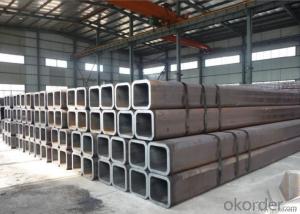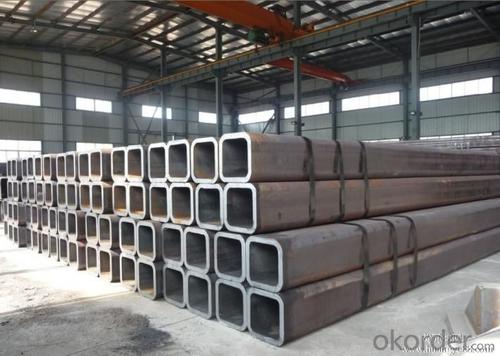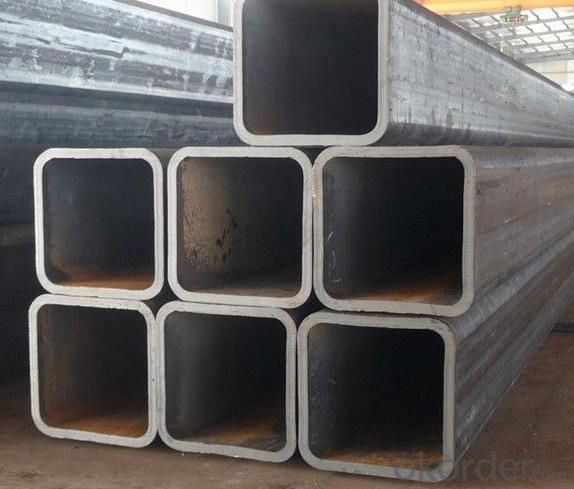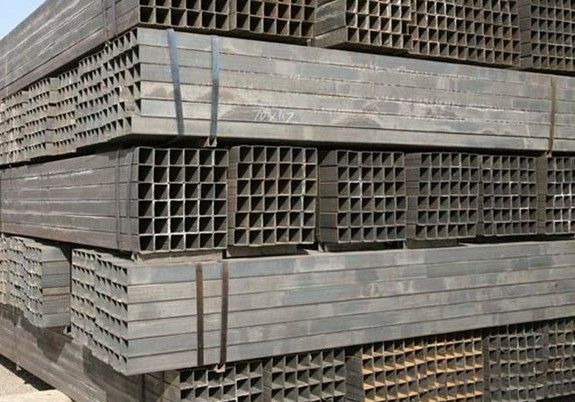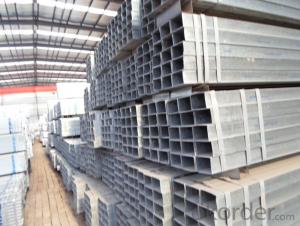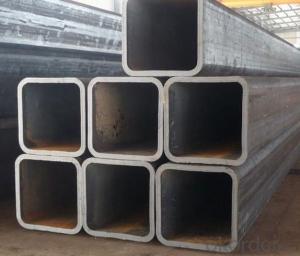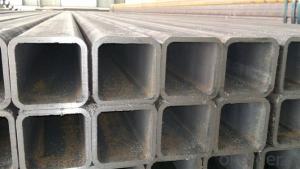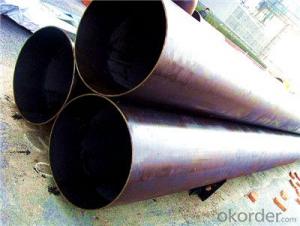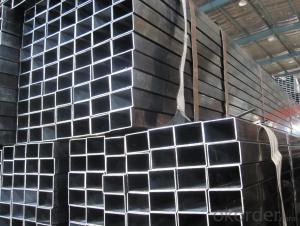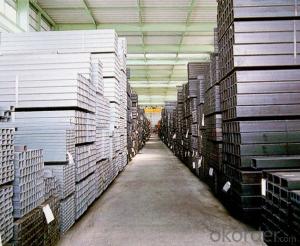Rectangular Steel Pipe Production Serious
- Loading Port:
- Tianjin
- Payment Terms:
- TT OR LC
- Min Order Qty:
- 25 m.t.
- Supply Capability:
- 7000 m.t./month
OKorder Service Pledge
OKorder Financial Service
You Might Also Like
1、Structure of Rectangular Steel Pipe Production Serious ASTM A103:
Rectangular Steel Pipe Production is formed by drawing a solid billet over a piercing rod to create the hollow shell. As the manufacturing process does not include any welding, seamless pipes are perceived to be stronger and more reliable. Historically Rectangular Steel Pipe was regarded as withstanding pressure better than other types, and was often more easily available than welded pipe.
2、Main Features of the Rectangular Steel Pipe Production Serious ASTM A103:
• High manufacturing accuracy
• High strength
• Small inertia resistance
• Strong heat dissipation ability
• Good visual effect
• More reasonable price
3、Rectangular Steel Pipe Production Serious ASTM A103 Specification:
Standard | GB, DIN, ASTM ASTM A106-2006, ASTM A53-2007 |
Grade | 10#-45#, 16Mn 10#, 20#, 45#, 16Mn |
Thickness | 8 - 33 mm |
Section Shape | Round |
Outer Diameter | 133 - 219 mm |
Place of Origin | Shandong, China (Mainland) |
Secondary Or Not | Non-secondary |
Application | Hydraulic Pipe |
Technique | Cold Drawn |
Certification | API |
Surface Treatment | factory state or painted black |
Special Pipe | API Pipe |
Alloy Or Not | Non-alloy |
Length | 5-12M |
Outer Diameter | 21.3-610mm |
Grade | 20#, 45#, Q345, API J55, API K55, API L80, API N80, API P110, A53B |
Standard | ASME, ASTM |
1) Material:20#(ASTM A 106/A53 GRB.API5LGRB,GB),45#,16Mn,10#.
2) Specification range:OD:21.3-610mm,WT:6-70mm,length:6-12m or according to the requirement of clients.
3) Excutive standards:GB,ASME API5L.ASTM A 106/A53,Despite of the above standards,we can also supply seamless steel pipe with standard of DIN,JIS,and so on,and also develop new products according to the requirements of our clients!
4) Surface:black lacquered,varnish coating or galvanized.
5) Ends:Beveled or square cut,plastic capped,painted.
6) Packing:bundles wrapped with strong steel strip,seaworthy packing.
4、Packaging & Delivery
Packaging Details: | seaworthy package,bundles wrapped with strong steel strip |
Delivery Detail: | 15-30days after received 30%TT |
5、FAQ of Rectangular Steel Pipe Production Serious ASTM A103:
①How is the quality of your products?
Our products are manufactured strictly according to national and internaional standard, and we take a test on every pipe before delivered out. If you want see our quality certifications and all kinds of testing report, please just ask us for it.
Guaranteed: If products’ quality don’t accord to discription as we give or the promise before you place order, we promise 100% refund. We company professional to provide these serious of pipes and what we can give you is not only in good sprice, the most important is we can provide you good quality.
②How about price?
Yes, we are factory and be able to give you lowest price below market one, and we have a policy that “ for saving time and absolutely honest business attitude, we quote as lowest as possible for any customer, and discount can be given according to quantity”,if you like bargain and factory price is not low enough as you think, just don’t waste your time.Please trust the quotation we would give you, it is professional one.
③Why should you chose us?
Chose happens because of quality, then price, We can give you both.Additionally, we can also offer professional products inquiry, products knowledge train(for agents), smooth goods delivery, exellent customer solution proposals.Our service formula: good quality+good price+good service=customer’s trust. We always to provide you discount, we are trying to give every customer best price and satisfy price.
SGS test is available, customer inspection before shipping is welcome, third party inspection is no problem.
6、Rectangular Steel Pipe Production Serious ASTM A103 Images:
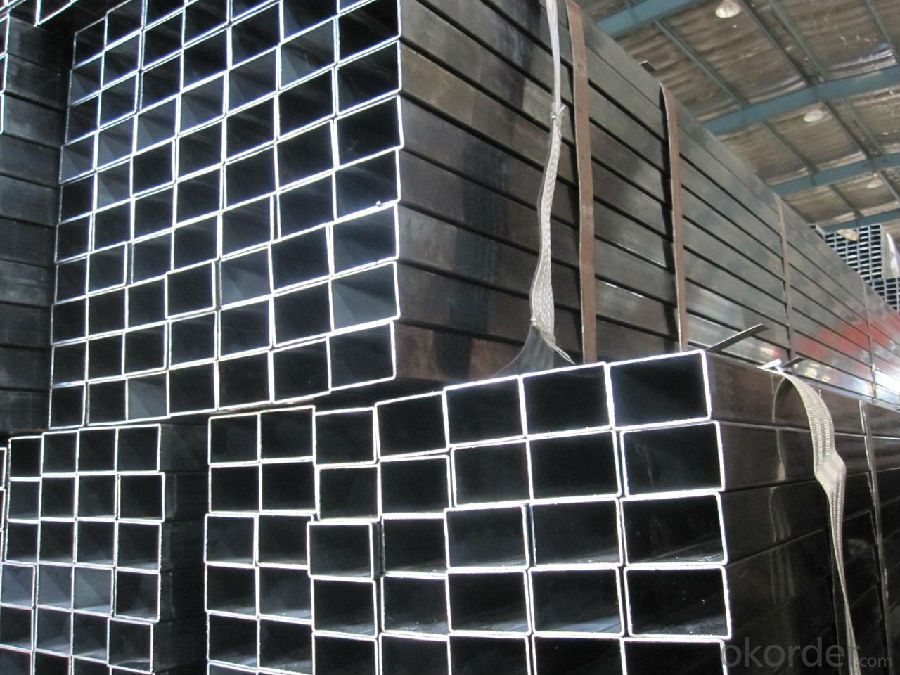
- Q: Are steel pipes suitable for industrial cooling systems?
- Indeed, steel pipes prove to be generally well suited for industrial cooling systems. Being a robust and long-lasting material, steel can endure the elevated pressures and temperature fluctuations commonly encountered in such systems. Furthermore, its exceptional resistance to corrosion renders it an ideal choice for utilization with water or other coolants. Moreover, steel pipes exhibit commendable thermal conductivity, facilitating efficient heat transfer during the cooling procedure. Additionally, these pipes are conveniently accessible and cost-effective, rendering them highly favored within industrial settings.
- Q: How are steel pipes connected to other plumbing components?
- Steel pipes are typically connected to other plumbing components through various methods such as threaded connections, welding, or using compression fittings.
- Q: Can steel pipes be used in extreme weather conditions?
- Steel pipes are suitable for use in extreme weather conditions because they are known for their high strength and durability. This makes them applicable in construction, infrastructure, and transportation. Steel pipes are commonly used to transport fluids and gases across industries and are specifically designed to withstand harsh environmental conditions such as extreme temperatures, high pressures, and corrosive environments. Even in extreme weather conditions like intense heat, cold, or heavy rain, steel pipes can maintain their structural integrity and functionality. Moreover, they can be coated or insulated to provide extra protection against corrosion and maintain desired temperatures. In conclusion, steel pipes are a dependable option for extreme weather conditions due to their strength, durability, and ability to resist various environmental factors.
- Q: Difference between cold rolled steel pipe and common steel pipe
- 3, the caliber of cold-rolled steel tube is smaller than that of hot rolled steel tube4, from the price point of view, cold-rolled steel pipe is 1000-2000 tons more expensive than hot-rolled steel pipe
- Q: What is the purpose of steel pipes?
- The purpose of steel pipes is to efficiently transport fluids, gases, and solids from one location to another, providing a durable and reliable means of conveying materials in various industries such as construction, oil and gas, plumbing, and infrastructure.
- Q: What is the meaning of "DN" and "Phi" in the dimensioning of steel pipe diameter and how to apply the mark?
- DN refers to the nominal diameter of the pipe, but this is neither the outside diameter nor the inside diameter, and the "Phi" means the outer diameter of the steel pipe. For example, the same nominal diameter of the steel pipe due to its different wall thickness, corresponding to the outer diameter is also different. As can be seen from the chart below:Project control table (commonly used) diameter pressure pipe standard pressure pipe standard pressure pipe standard specification DN- nominal diameter: diameter of large diameter series DN15- 22mm DN20- 27mm DN25- phi, Phi Phi Phi Phi 34mm, DN32- 42mm DN40- 48mm DN50- 60mm DN65-, Phi Phi 76 (73) mm, DN80- 89mm DN100- 114mm DN125- and Phi Phi Phi. 140mm DN150- 168mm DN200- 219mm DN250- phi, Phi Phi Phi Phi 273mm, DN300- 324mm DN350- 360mm DN400- 406mm DN450- 457mm DN500- and Phi Phi Phi Phi, 508mm DN600- 610mm, DN15- 18mm series of small diameter Phi Phi Phi, DN20- 25mm DN25- 32mm DN32- 38mm DN40- 45mm DN50- Phi Phi, Phi Phi Phi 57mm DN65- 73mm, DN80- 89mm DN100- 108mm, DN125- 133mm DN150- 159mm DN200- and Phi Phi Phi Phi, 219mm DN250- 273mm DN300- 325mm DN350- 377mm, Phi phi,
- Q: Can steel pipes be used for desalination plants?
- Yes, steel pipes can be used for desalination plants. Steel pipes are commonly used in desalination plants for transporting seawater, brine, and treated water due to their high strength, durability, and resistance to corrosion. They can withstand the harsh conditions and corrosive nature of saltwater, making them a suitable choice for the construction and operation of desalination plants.
- Q: What is the importance of corrosion resistance in steel pipes?
- The importance of corrosion resistance in steel pipes is significant as it helps to extend the lifespan of the pipes, ensures their structural integrity, and maintains the quality of the fluid or gas being transported. Corrosion can lead to pipe failures, leaks, and contamination of the contents, resulting in costly repairs, environmental hazards, and potential safety risks. Therefore, incorporating corrosion-resistant properties in steel pipes is crucial for their long-term performance, durability, and overall efficiency.
- Q: What is galvanized steel pipe?
- Galvanized steel pipe is a type of steel pipe that has been coated with a layer of zinc to protect it from corrosion. This process involves immersing the steel pipe in a molten zinc bath, which creates a protective barrier on the surface of the pipe. The zinc coating helps to prolong the lifespan of the steel pipe, making it resistant to rust and other forms of corrosion. Galvanized steel pipes are commonly used in plumbing, water supply, and construction applications.
- Q: How do you calculate the weight of a steel pipe?
- To calculate the weight of a steel pipe, you would need to know the dimensions of the pipe, specifically the outer diameter (OD), wall thickness, and length. Firstly, you need to determine the cross-sectional area of the pipe. This can be done by subtracting the inner diameter (ID) from the outer diameter (OD) and dividing the result by 2 to get the radius. Then, you can use the formula A = πr^2 to calculate the area. Next, multiply the cross-sectional area by the length of the pipe to get the volume. The formula for volume is V = A * L, where A is the cross-sectional area and L is the length. Finally, to calculate the weight of the steel pipe, you need to multiply the volume by the density of steel. The density of steel is typically around 7850 kilograms per cubic meter (kg/m^3) or 0.2836 pounds per cubic inch (lb/in^3). The formula for weight is W = V * ρ, where V is the volume and ρ is the density of steel. It's important to note that if you are working with different units, you will need to convert them to match the units of the density. For example, if the length is in feet and the density is in pounds per cubic inch, you would need to convert the length to inches before performing the calculations. Remember to double-check your measurements and calculations to ensure accuracy.
Send your message to us
Rectangular Steel Pipe Production Serious
- Loading Port:
- Tianjin
- Payment Terms:
- TT OR LC
- Min Order Qty:
- 25 m.t.
- Supply Capability:
- 7000 m.t./month
OKorder Service Pledge
OKorder Financial Service
Similar products
Hot products
Hot Searches
Related keywords
